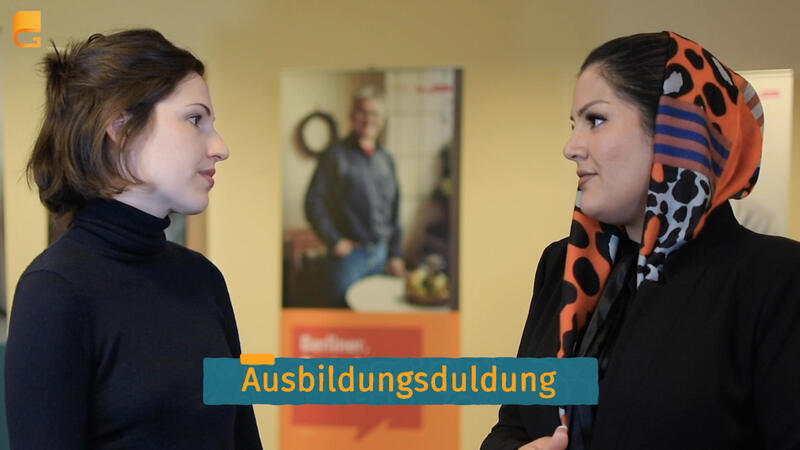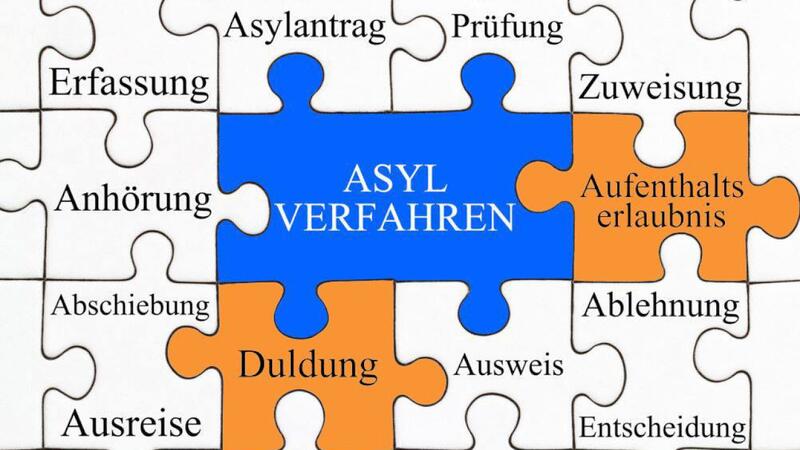Asylum Application Rejected
Is there any chance I can stay in Germany?
If the BAMF rejects your asylum application, you will be asked to leave Germany. Refugees who receive a "simple" rejection ("einfachen Ablehung") have 30 days to depart. You may receive a "simple" rejection if no other European country is responsible for your asylum application (Dublin regulation) and the BAMF does not assume you intend to deceive them or have economic motives for your flight. If your application for asylum is rejected as "inadmissible" ("unzulässig") or "obviously unfounded" („offensichtlich unbegründet“), you only have one week to voluntarily leave Germany. Your asylum application may be rejected as "inadmissible" if, due to the Dublin Regulation, another EU country is responsible for your asylum procedure. Rejection as "obviously unfounded" may happen, for instance, when the BAMF notices significant contradictions in your history and your flight reasons or believes that you have fled to Germany for economic reasons.
To see how much time you have for your voluntary departure, check the rejection notice you have received from the BAMF. The deadline runs from the time you receive the notice. You can find the exact delivery date on the envelope in which you have received the rejection notice. If you do not leave Germany within the designated deadline, you may be deported, i.e. the police and immigration authorities may pick you up at home to send you back to your home country.
In any case, you need to seek advice from a lawyer or counselling centre if you have received a rejection notice from the BAMF. There are several alternatives to voluntary departure or deportation, the most important ones of which are presented below.
What options do I have?
You can take legal actions against the BAMF's decision. Then, a court decides whether you are entitled to asylum, refugee status, subsidiary protection or a residence permit due to a ban on deportation. A counselling centre or lawyer can tell you if taking legal action makes sense in your case and what steps it entails. You can find specialised lawyers and counselling centres in your area on our local information page. Enter the name of your city and search for asylum, residence or legal counselling centres nearby. The cost of the lawsuit may be borne by the state. You can find out more about this in our section "Legal aid".
Refugees who receive a "simple" rejection ("enifachen Ablehung") have 2 weeks to file a lawsuit. The deadline runs from the time you receive BAMF's rejection notice in your mailbox. The delivery date of this letter counts as the start of your deadline, so remember to keep the envelope safe to be able to prove the date of receipt later. If your application is rejected as "inadmissible" ("unzulässig") or "obviously unfounded" („offensichtlich unbegründet“), you have one week to submit the lawsuit to the competent administrative court and file an "urgent appeal" ("Eilantrag"). If the court accepts the urgent appeal, you can stay in Germany during the legal proceedings. Otherwise, you may be deported, even though your complaint is still in process.
Attention: If you submit an urgent appeal while your application has been rejected as "inadmissible" ("unzulässig") under the Dublin regulation, your six-month transfer period will start over. Make sure to seek advice from a lawyer in advance.
If there is no time to talk to a counselling centre or a lawyer, you can personally go to the competent administrative court and file your complaint in writing or orally. You can download complaint sample forms for simple rejection, rejection as "inadmissible", and rejection as "obviously unfounded" and fill and submit it to the court. The relevant administrative court is specified in the rejection notice you receive from the BAMF. At each administrative court, there is a legal expert ("Rechtsantragstelle") who can help you with the complaint. Keep in mind that despite filing the claim, you still need to go to a lawyer. You now have two weeks to explain to the court why BAMF's decision is incorrect, and you require the assistant of a lawyer to do so.
In the case of "simple" rejection or when your urgent appeal has been accepted, you must not be deported during the court proceedings. Before the court concludes your case, you may keep your temporary residence permit ("Aufenthaltsgestattung") and continue to receive asylum seeker benefits. It often takes a long time before the court decides. You may have to wait for a year or more. Try your best to use this time to learn German and, for instance, start vocational training.
After you file the complaint, the Administrative Court examine your reasons for flight and the decision of the BAMF once again, i.e. the judges will read the minutes of your hearing, review your evidence, and then, usually invite you to a court hearing, in which you will be interviewed again. After all that, the court decides about your asylum application:
- If the judge concludes that you meet the requirements for asylum rights, refugee status, subsidiary protection or a national ban on deportation, the BAMF's rejection will be revoked, and you will be granted a residence permit.
- If the judges confirm the BAMF's decision and do not recognise you as being entitled to any forms of protection, your complaint will be dismissed, and your obligation to leave Germany remains valid.
When the administrative court comes to a decision, the asylum procedure is often considered to be concluded. If the judge confirms the BAMF's decision, your lawyer can also apply for approval for submitting an appeal ("Zulassung der Berufung"). If the Higher Administrative Court ("Oberwaltungsgericht") accepts your lawyer's request, your asylum application will be examined again-but keep in mind that the Higher Administrative Court rarely approves such appeal requests. Appeal requests are accepted when, for instance, crucial questions (e.g. about your reasons for flight) have remained unanswered, or in cases in which the judges hold very different viewpoints on an issue.
If there is new evidence regarding your persecution or new circumstances occur (e.g. a change of government in your home country), you can apply for asylum again, i.e. you can submit a subsequent asylum application or „Asylfolgeantrag “. You can also hand in a subsequent asylum application if you suffer from a severe war trauma which has remained undetected before, or in case you have a severe illness that is not curable in your country of origin. A counselling centre or lawyer can tell you if a new asylum application is plausible and useful. You can find specialised lawyers and counselling centres in your area on our local information page. Enter the name of your city and search for asylum, residence or legal counselling centres nearby.
You must personally submit the subsequent asylum application to the BAMF's branch office in the initial reception facility where you used to live. If you have left Germany meanwhile, you have to reside in an initial reception facility for a maximum of six months again. As an asylum seeker, once more, the residence restrictions apply to you, i.e. you cannot leave your city unless you receive permission from the Immigration Office. Read more in our chapter Temporary Residence permit (“Aufenthaltsgestattung”).
Sometimes there are obstacles to deportation- for instance, when you, as an asylum seeker, do not have a passport or are incapable of travelling. In such cases, you may be issued a so-called "Duldung" or a tolerated stay permit. A tolerated stay permit is not a residence permit, but a substitute, temporary residence document ("Aufenthaltsgestattung"). Individuals who has been issued a "Duldung" can legally reside in Germany for the time, but their obligation for departure remains valid.
The Immigration Office can also permit you a tolerated stay if, for instance, you need to finish a medical treatment or expect a significant operation in Germany. You may be issued a "Duldung" also when you are on the verge of finishing school or a vocational training programme. If you start a vocational training programme which takes at least two years to accomplish, you are entitled to a so-called "Ausbildungsduldung" under certain conditions. If you work, you can obtain a so-called “Beschäftigungsduldung”, given you meet specific prerequisites.
In rare cases, the interior ministries of the federal states or the Federal Ministry of the Interior may issue a deportation ban for certain groups of refugees for a specific period - this is often the case, for instance, when there is an acute disaster situation in a country (e.g. a famine).
A "Duldung" is usually only issued for a specific number of days, weeks or months. If the deportation impediment (or other causes of issuing the "Duldung") persist, your tolerated stay permit will be extended. When the deportation impediments or other relevant reasons are removed, your tolerated stay permit will not be extended, and you will have to leave Germany. You can read more about tolerated stay ("Duldung") in our chapter "Tolerated Stay". The staff at a counselling centre or a lawyer can tell you whether you may be issued a "Duldung" or not, and explain the relevant steps you have to take. You can find specialised lawyers and counselling centres in your area on our local information page. Enter the name of your city and search for asylum, residence or legal counselling centres nearby.
When you are well-integrated in Germany and deportation is likely to put you in a very challenging situation, you can try to obtain a residence permit by submitting a hardship application ("Härtenfallantrag"). In such cases, if you speak German well enough, attend school, go through vocational training, study at university or have a job, you have a higher chance of being issued a residence permit. Furthermore, it is beneficial if you have some volunteer work experience and many friends and acquaintances (in Germany) who can support you in your hardship application. The interior ministry of your federal state of residence decides whether your case must be recognised as a case of hardship - each federal state has a so-called hardship commission ("Härtefallkommision") for the purpose. The staff at these hardship commissions can inform you whether you can fill out a hardship application and the relevant steps you must take. On basiswissen.asyl.net, you can find links to the hardship commission responsible for you. Please note: part of the information is only available in German.
It is recommended to seek advice from a lawyer or counselling centre in advance. They can tell you how significant your chances are. You can find specialised lawyers and counselling centres in your area on our local information page. Enter the name of your city and search for asylum, residence or legal counselling centres nearby.
You can try to inform the state parliament ("Landestag") or the "Bundestag" (the German federal parliament) of your situation by sending them a petition, in which you ask for the reconsideration of your asylum application or the right of residence in Germany. Keep in mind that you cannot send a petition and a hardship application ("Härtenfallantrag") at the same time. In principle, a petition has little chance of success. You must have strong reasons for the continuation of your stay in Germany; reasons which are not commonly shared by other rejected asylum seekers. You can send the petition as a normal letter to the "Landtag" or "Bundestag". However, it makes sense to try and personally contact individual members of the Landtag or Bundestag and convince them to support you. The more people support you, the higher your chances.
Please note: A petition has no suspensive effect on your possible deportation, i.e. you may be deported while the state parliament or the federal parliament is looking into your case.
When you fear imminent deportation, you can ask for asylum at a church. The church will listen to your story and then try to help you find a solution. They may decide to take you in and protect you from deportation- this is called church asylum or "Kirchenasyl". Church asylum can be your last option, but keep in mind that it does not always work. Sometimes, asylum seekers are deported despite their church asylum.
The churches, which protect asylum seekers through a church asylum, often only accept people for a limited time. While you take refuge under the church's protection, the church negotiates with the authorities and try to find a solution to your circumstances. Church asylum is quite tricky and exhausting. Negotiation with the authorities can take a long time, during which you are entirely dependent on the church. In many cases, during a church asylum, you no longer receive state benefits and cannot leave the church grounds.
Please note: For a church, the religious beliefs of an asylum seeker are not an issue. You do not have to be a Christian to receive support through church asylum.
A counselling centre or lawyer can tell you whether opting for church asylum is helpful in your case or not. They may also know in which church you have a better chance. You can find specialised lawyers and counselling centres in your area on our local information page. Enter the name of your city and search for asylum, residence or legal counselling centres nearby. For more information about church asylum (in German), visit www.kirchenasyl.de.
Important
You must not be deported if your complaint against the "simple rejection" ("einfachen Ablehnung") of your asylum application is being processed or in case your "urgent application" ("Eilantrag") has been accepted.








